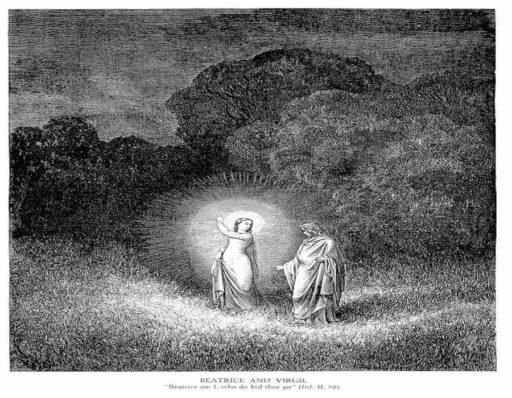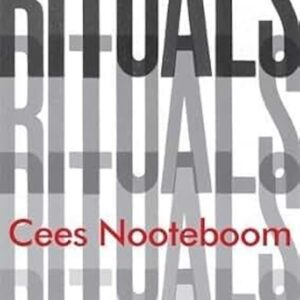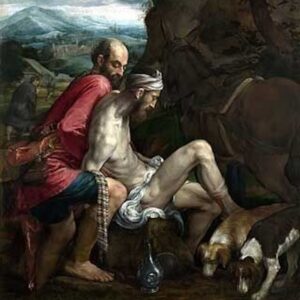In recent years Dante’s Comedy has been important to my thinking about high fantasy. That phrase, as far as I’m aware, appears for the first time in Western literature in the middle of the Purgatorio and at the very end of the Paradiso. L’alta fantasia. It was a turning point in the history of the idea of fantasy, because now fantasy could be high—that is, heaven-sent, theophany. This shift held profound implications for the subsequent development of what we now call fiction. Arguably, it paved the way for art to assume much of the role of religion. The phrase appears in my novel which Slant will be publishing. One way of describing that novel would be to call it a writer’s troubled questioning whether fiction in the Anthropocene may still validly partake of fantasy and aspire to disclose religious truth. But in the last few weeks, as people have marked the 700th anniversary of Dante’s death, my thought has returned to my first encounter with Dante.
Autumn of 2002 and winter of 2003, I spent many afternoons in a café near the Classics Department of the University of Cincinnati, poring over Dante’s New Life and his Comedy, dictionaries and grammars and commentaries piled around me as the hours lapsed and the ash tray filled up. In my memory of these seasons, it is always raining. The café was staffed by graduate students from the Conservatory, all of whom I found beautiful. The establishment consisted of two dilapidated stories and a courtyard that looked like a construction site. The beautiful young women who worked at the café and were barely conscious of my existence always played beautiful music, usually baroque or renaissance polyphony. I was twenty years old. My first attempt at marriage was collapsing. Dante was saving my life.
I was a sucker for a good love story in those days. (I still am.) By good love story, I mean—or I would have meant then—heart-breaking. That’s how I was turned onto Dante. In my Latin seminar that autumn we were reading the Aeneid. When we got to the part where Dido meets her doom—that is, when she realizes she’s falling in love with Aeneas—the Queen of Carthage tells her sister, agnosco veteris vestigia flammae. “I recognize the signs of the old fire.” She is terrified, because she vowed after the death of her husband never to take another man. And oaths and promises really meant something in those days. Dido was right to be terrified: her love for Aeneas spelled her death, because Aeneas would not stay for her.
The Latin professor explained this, and then he paused and said, “You know, Dante took up this line to pay homage to Vergil. But he gave it a different cast, because he conceived of love differently.” I asked what he meant, and the professor asked if I’d ever read the Comedy. I said I hadn’t, and my professor looked at me and was silent for a moment. When he spoke, he was addressing only me, and said simply, “You ought to, and you ought to read it in the original.” The implication was that I ought to already have read it. I don’t know if professors still address their students that way, which inspires a kind of productive shame. I don’t know if the word ought carries the same weight, coming from one whom you regard as a master. Anyhow it settled the matter for me. That and the bit about love.
Conosco i segni de l’antica fiamma. That is how Dante translated Vergil’s line. Now it is the man’s line, spoken by Dante the pilgrim at the edge of the terrestrial Paradise at the top of Purgatory. Vergil can guide Dante no farther, for he was a pagan. He must hand Dante off to Beatrice, who was deceased by that time (that is, by the time Dante was “in the middle of life,” when the poem is supposed to take place). It is a gut-wrenching moment, because there are two kinds of love here. As one love arrives, the other must depart. Dante speaks the line to Vergil when he sees Beatrice approaching, in this way paying tribute to Vergil. You have to think about what Dante says of Vergil. At the beginning of the Inferno he tells him:
Tu se’l mio maestro e’l mio autore
Tu se solo colui da cu’ io tolsi
Lo bello stilo che m’ha fatto onore
You are my master and my author,
You alone are he from whom I took
The beautiful style that has brought me honor.
I remember thinking, when I first read those lines, that no higher praise could be given. But then I got to the moment in the Purgatorio that my Latin professor referenced, the arrival of Beatrice. There is no higher praise for an artist than to show them (if only in fiction) that their work lives on in you, that for you it is not some relic or artifact but an expression of reality, true tomorrow as it is today and was yesterday. Some writers make whole books out of admiration for other writers, or translate them: I think of Charles Olson’s Melville, Hugh Kenner’s Pound, D. H. Lawrence’s study of nineteenth century American authors, Pound’s translations of the Troubadours, Edmund Spenser’s translation-imitations of Joachim du Bellay, Hölderlin’s Pindar and Anne Carson’s Sappho…. Heck, I myself translated Paul Claudel.
I was moved even at twenty to see Dante turn to Vergil and use his master’s own line, but rendered in the Latin that Dante spoke (which had become medieval Tuscan), to describe an equally powerful but very different experience of love, the experience of love as theophany and as the spark of that virtue which delivers a man from hell (such is the intervention of Beatrice in the Comedy). But Vergil is already gone and cannot receive this testimony.
Dante is shattered. No longer as a character but in the voice of the poet speaking to the reader—this would be the narrator if you imagine the Comedy as fiction—he declares of the vanished Latin poet that he was his “dolcissimo patre, / Vergilio a cui per mia salute die’mi”—”sweetest father, / Vergil to whom for my salvation I gave myself.” Even here, where it is clear that Vergil (which is to say Poetry) is not alone sufficient to save his soul, Dante will not extinguish the fire of his old love—for Vergil.
In that long lost rainy grey epoch of my life, in that dingy café, I had on my table at times Charles Williams’s The Figure of Beatrice and T. S. Eliot’s essays on Dante, the title of one of which I have used for this very un-Eliotic post. A few years later, when I was a doctoral student, I read Erich Auerbach’s Dante: Poet of the Secular World and Osip Mandelstam’s “Conversation about Dante.” But I find now that the pathos of the Comedy for me is still that moment of loss and gain intermixed, and the heartbreak of praise that cannot be delivered.
Jonathan Geltner lives in Ann Arbor MI with his wife and two sons. His translation of Paul Claudel’s Five Great Odes is available from Angelico Press and a novel, Absolute Music, is forthcoming from Slant. He writes more about the meeting of fantasy and fiction with theology, philosophy, music and the sense of place at betweentwomaps.com





